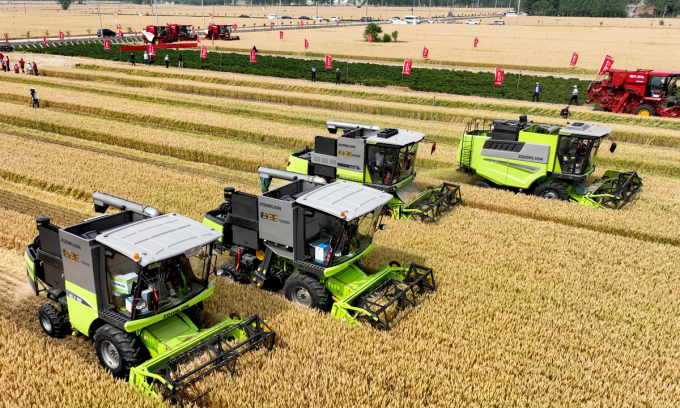June 15, 2025 | 11:45 GMT +7
June 15, 2025 | 11:45 GMT +7
Hotline: 0913.378.918
June 15, 2025 | 11:45 GMT +7
Hotline: 0913.378.918

An agricultural machinery operator drives a harvester at a farm in Bozhou, East China’s Anhui Province on May 27, 2022. As Grain in Ear, a traditional Chinese calendar day signaling a proper time for farming, approaches, local farmers have ratcheted up efforts to either plant or harvest summer grain. Photo: VCG
Chinese Foreign Ministry spokesperson Wang Wenbin said on Friday that China can ensure domestic grain supply for the Chinese people and there is no need to stockpile food from the international market in response to criticism from some Western countries that China is hoarding grain and requiring China to take more action for global food security.
"China is fully equipped, capable and confident on its own strength to ensure food supply for the Chinese people," said Wang.
According to Wang, the Chinese government values food security and always sticks to self-sufficiency in grain production and absolute grain security, adding that China's grain production has been stabilized over 1.3 trillion jin (650 billion kilograms) for seven consecutive years as the largest grain producer and the third largest grain exporter across the globe.
Wang also stressed that China achieves one-fourth of the world's total grain production and feeds one-fifth of the global population with less than nine percent of the land on earth, which already made an extraordinary contribution to ensure international food security.
Following the wheat reaching maturity in major domestic summer grain areas, several major production areas started harvesting while promoting technologies to reduce the attrition for harvest machines, aiming to increase yield, China's national broadcaster CCTV reported on Friday.
The total harvested areas of wheat reached 25.01 million mu (1,67 million hectares) as of May 27, with the overall progress reaching 8.2 percent and one percentage point faster compared to 2021.
Some 2.5 billion jin of grains will be saved with the damage for harvesting machines being reduced by one percentage point. Data from the Ministry of Agriculture and Rural Affairs showed that more than 650,000 machines can be used for harvesting summer grains and the total number is sufficient for domestic use.
China has been taking action and efforts to contribute to global food security.
For instance, China has always been an important strategic partner of the United Nations Food and Agriculture Organization (UN FAO)'s South-South Cooperation. China has donated $130 million in recent years to the fund under the framework.
China also sent out a large number of technicians and experts to Asia, Africa, Latin America and the Caribbean, Pacific Island countries and France, as China became the developing country with the most funding, sending out the most experts and implementing most projects under the FAO's South-South Cooperation framework.
Since the beginning of COVID-19 outbreaks, China has also provided emergency food aid to a number of countries, while advocating reducing food loss and waste. China held the International Conference on Food Loss and Waste in 2021 which received active responses from the international community.
Wang also urged relevant countries to take more international responsibility by reducing unnecessary food waste as multiple developing countries still struggle with food shortage while some developed countries are still wasting a large amount of food.
For example, some 30 to 40 percent of food is wasted in the US each year, with a total of 103 million tons worth $161 billion in 2018 alone, data from the US Department of Agriculture showed.
(Global Times)

(VAN) Extensive licensing requirements raise concerns about intellectual property theft.

(VAN) As of Friday, a salmonella outbreak linked to a California egg producer had sickened at least 79 people. Of the infected people, 21 hospitalizations were reported, U.S. health officials said.

(VAN) With the war ongoing, many Ukrainian farmers and rural farming families face limited access to their land due to mines and lack the financial resources to purchase needed agricultural inputs.

(VAN) Vikas Rambal has quietly built a $5 billion business empire in manufacturing, property and solar, and catapulted onto the Rich List.

(VAN) Available cropland now at less than five percent, according to latest geospatial assessment from FAO and UNOSAT.

(VAN) Alt Carbon has raised $12 million in a seed round as it plans to scale its carbon dioxide removal work in the South Asian nation.

(VAN) Attempts to bring down the price of the Japanese staple have had little effect amid a cost-of-living crisis.